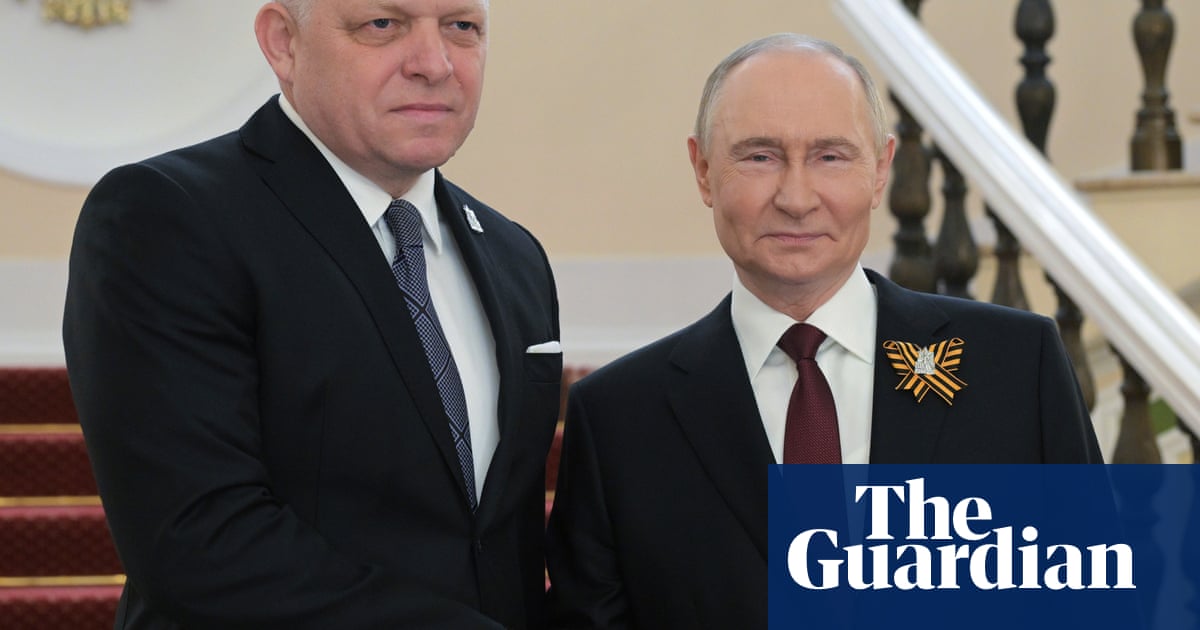Despite warnings fromEuropean Unionofficials, Slovakia’s Moscow-friendly prime minister, Robert Fico, shook hands with Vladimir Putin at the Kremlin before becoming the only EU leader to attend Russia’s 9 May parade of military forces waging war on Ukraine.
The Serbian president, Aleksandar Vučić, whose country aspires to join the 27-nation union, also accepted the Russian president’s invitation to attend the annual Victory Day celebrations marking the defeat of Nazi Germany in the second world war.
The pair were the only European leaders to travel to Moscow after strong injunctions from EU officials not to do so. On Thursday, the bloc’s chief diplomat, Kaja Kallas, said: “All those who truly support peace cannot stand side-by-side with Putin. Those who truly support peace should be inUkrainetomorrow, not Moscow.”
Kallas added this week that the Russian president was “waging a war right now, not a war from history. That remains on the conscience of those attending.”
Poland’s prime minister,Donald Tusk, who later on Friday was due to sign a cooperation and friendship treaty with France including joint security and defence commitments, sharply criticised both leaders, although he did so without naming them.
Tusk said: “For me it is unthinkable that one can be from this part of the world and, during Russia’s aggression against Ukraine, be in Red Square and celebrate Victory Day with those who are murdering children, civilians and attacking other countries.”
It is unclear what, if any, sanctions the EU could apply to either Bratislava or Belgrade. António Costa, the president of the European Council, is due to visit the Serbian capital on Monday. An EU official in Brussels suggested he would express criticism of the visits, saying: “We don’t engage only to pass easy and good messages.”
Kallas said last month that participation in the 9 May celebrations in Moscow would “not be taken lightly on the European side”. She called on representatives of EU member states and candidate countries to mark the day in Ukraine instead.
The EU foreign affairs chief was one of a delegation of EU officials and foreign ministers, which also included the British foreign secretary, David Lammy, in Lviv on Friday to honour the victims of Russia’s war and back a special tribunal to investigate allegedRussian war crimes.
Fico, who last met Putin in December, said in April that “nobody will tell me where to go and where not to go”. He said he was going to “a commemorative event, that’s all”, to “pay homage to thousands of Red Army soldiers who died liberating Slovakia”.
The Slovakian prime minister, who has adopted Kremlin lines and sided with Hungary’s illiberal leader, Viktor Orbán, as a pro-Russian voice in the EU, also took part in bilateral meetings and attended a wreath-laying ceremony in Moscow.
Since winning re-election in 2023, he has halted Slovakia’s military aid to Ukraine, criticised EU sanctions against Russia, and vowed to block Ukraine from joining Nato. He often attacks Ukraine’s president, Volodymyr Zelenskyy, calling him a “comedian who lies as he breathes” and accusing him of “needing this war” to keep his job.
He was forced, however, to take a somewhat circuitous route to Moscow on Thursday night to attend the ceremonies after the Baltic states of Lithuania and Latvia both closed their airspace to flights that might have carried him to the event.
Fico’s Slovakian government plane took off from Bratislava airport on Thursday afternoon and was due to land in Moscow at about 9.30pm, but Lithuania said it would not allow flights carrying either him or Vučić to Moscow.
Latvia similarly said it it was closing its airspace to any flights carrying guests to the parade, although did not specifically mention Fico. The Baltic bans were “exceptionally complicating our schedule”, Fico said on his Facebook page.
Fico’s final flight path took him over Hungary, Romania, the Black Sea, Georgia and the Russian Federation, a journey of more than five hours compared with the two and a half it should have taken.
